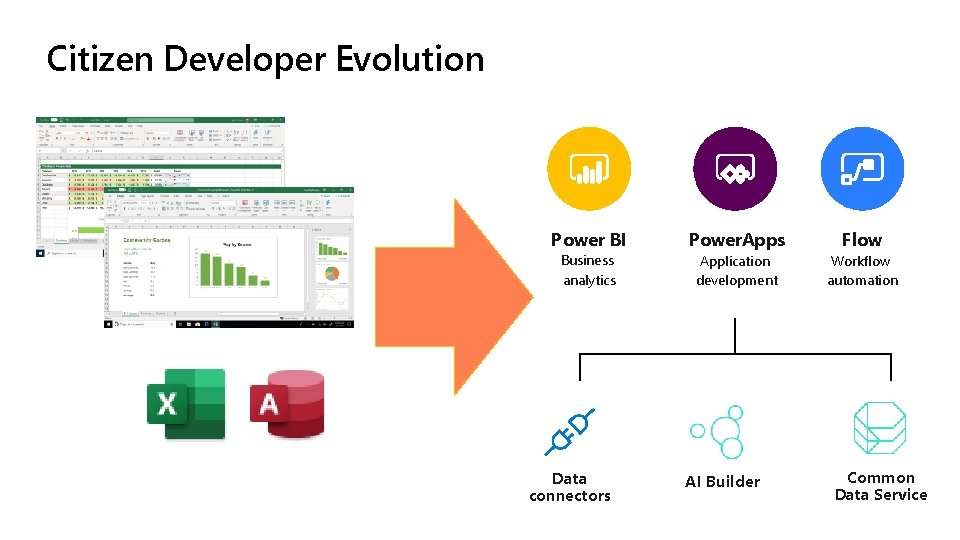MS Power Platform
Unlock the full potential of Microsoft Power Platform with our two integrated programmes: Functional Consultant and Full‑Stack Developer.
What Is a Citizen Developer?
A citizen developer is a business user who builds applications and automations using low‑code/no‑code tools, without formal software engineering skills. By leveraging Power Apps, Power Automate, Power BI, and Dataverse, citizen developers:
- Rapidly prototype and deploy solutions tailored to their teams’ needs
- Bridge the gap between business requirements and IT delivery
- Democratize innovation across the organization
Why It Matters Today
- Speed & Agility: Traditional IT backlogs can delay solutions by months—citizen development turns weeks of work into hours.
- Cost Efficiency: Reduces reliance on external development resources and cuts manual work through automation.
- Innovation Culture: Empowers every employee to solve problems proactively, driving continuous improvement.
Core Skills & Certifications
This track prepares you for four Microsoft exams:
| Skill Area | Exam Code | Description |
|---|---|---|
| Platform Fundamentals | PL‑900 | Understand Power Platform components, Dataverse, and connectors |
| Functional Consulting | PL‑200 | Design canvas & model‑driven apps, implement business logic |
| Data Analysis & Reporting | PL‑300 | Prepare, model, and visualize data in Power BI |
| Pro‑Developer Extensions | PL‑400 | Build custom components (PCF), plugins, connectors, and implement ALM & DevOps |
Track Overview
- Total Duration: 92 hrs instructor‑led + 92 hrs self‑study & labs
- Notional Hours: 232 hrs → 23 credits (NZQF Level 5)
- Delivery: Live online (Zoom & Teams) + LMS recordings
- Programme Fees: Functional Consultant $2,300 | Full‑Stack Developer $3,220
- Certification: Discounted exam vouchers included
- Cohort Size: Minimum 10 participants
1. Functional Consultant Programme
Exams: PL‑900 & PL‑200
Instructor‑Led: 40 hrs (5 weekends × 8 hrs)
Self‑Study & Labs: 40 hrs
Assignments & Prep: 10 hrs
Notional Hours: 100 hrs → 10 credits
Price: $2,300
Weekend Modules
- Power Platform Fundamentals (PL‑900)
- Dataverse & Data Modeling (PL‑900)
- Canvas Apps Essentials (PL‑200)
- Model‑Driven Apps & Business Logic (PL‑200)
- Power Automate Foundations (PL‑200)
2. Full‑Stack Developer Programme
Exams: PL‑300 & PL‑400
Instructor‑Led: 52 hrs (7 weekends; final weekend 4+4 hrs)
Self‑Study & Labs: 52 hrs
Assignments & Prep: 14 hrs
Notional Hours: 132 hrs → 13 credits
Price: $3,220
Weekend Modules
- Power BI: Data Prep & Query (PL‑300)
- Power BI: Data Modeling & DAX (PL‑300)
- Power BI: Report Design & Deployment (PL‑300)
- ALM & DevOps Strategy (PL‑400)
- Canvas & PCF Component Framework (PL‑400)
- Plugins & Custom Connectors (PL‑400)
- Testing & Performance Tuning + Exam Prep (PL‑400)
Investment & Commitments
| Programme | Notional Hours | Credits | Price (NZD) |
|---|---|---|---|
| Functional Consultant | 100 hrs | 10 | $2,300 |
| Full‑Stack Developer | 132 hrs | 13 | $3,220 |
Payment & Terms
- Installments available (2 payments)
- Discounted exam vouchers included





